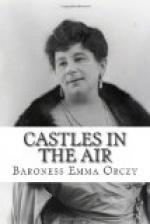Then he ordered us all into the room pompously labelled “Reception,” and there proceeded once more to interrogate us all, making copious notes in his leather-bound book all the time, whilst I, moaning and lamenting the loss of my faithful friend and man of all work, loudly demanded the punishment of his assassin.
Theodore’s coat, his hat, the blood-stained rag, had all been brought down from No. 25 and laid out upon the table ready for the inspection of M. the Commissary of Police.
That gentleman arrived with two private agents, armed with full powers and wrapped in the magnificent imperturbability of the law. The gendarme had already put him au fait of the events, and as soon as he was seated behind the table upon which reposed the “pieces de conviction,” he in his turn proceeded to interrogate the ginger-pated miscreant.
But strive how he might, M. the Commissary elicited no further information from him than that which we all already possessed. The man gave his name as Aristide Nicolet. He had no fixed abode. He had come to visit his friend who lodged in No. 25 in the Hotel des Cadets. Not finding him at home he had sat by the fire and had waited for him. He knew absolutely nothing of the dog and absolutely nothing of the whereabouts of Theodore.
“We’ll soon see about that!” asserted M. the Commissary.
He ordered a perquisition of every room and every corner of the hotel, Madame the proprietress loudly lamenting that she and her respectable house would henceforth be disgraced for ever. But the thieves—whoever they were—were clever. Not a trace of any illicit practice was found on the premises—and not a trace of Theodore.
Had he indeed been murdered? The thought now had taken root in my mind. For the moment I had even forgotten Carissimo and my vanished five thousand francs.
Well, Sir! Aristide Nicolet was marched off to the depot—still protesting his innocence. The next day he was confronted with Mme. la Comtesse de Nole, who could not say more than that he might have formed part of the gang who had jostled her on the Quai Voltaire, whilst the servant who had taken the missive from him failed to recognize him.
Carissimo was restored to the arms of his loving mistress, but the reward for his recovery had to be shared between the police and myself: three thousand francs going to the police who apprehended the thief, and two thousand to me who had put them on the track.
It was not a fortune, Sir, but I had to be satisfied. But in the meanwhile the disappearance of Theodore had remained an unfathomable mystery. No amount of questionings and cross-questionings, no amount of confrontations and perquisitions, had brought any new matter to light. Aristide Nicolet persisted in his statements, as did the proprietress and the concierge of the Hotel des Cadets in theirs. Theodore had undoubtedly occupied room No. 25 in the hotel during the three days while I was racking my brain as to what had become of him. I equally undoubtedly saw him for a few moments running up the Rue Beaune with Carissimo’s tail projecting beneath his coat. Then he entered the open doorway of the hotel, and henceforth his whereabouts remained a baffling mystery.




